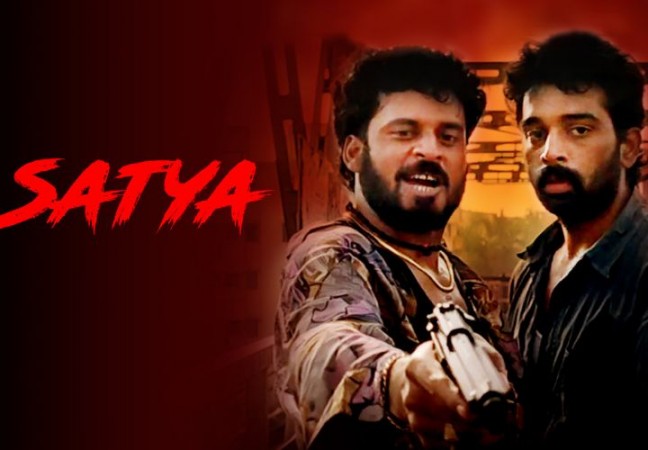
Few movies in Indian cinema history have made as lasting an impression as Ram Gopal Varma's masterpiece "Satya," which debuted in 1998. In terms of storytelling and the emergence of new talent, the crime drama, which is set in the seedy side of Mumbai, was a turning point for Bollywood. Apart from its gritty story, what distinguishes "Satya" is the unusual collaboration that gave it life. Ram Gopal Varma made a risky choice by selecting lesser-known actors for the lead roles and hiring Anurag Kashyap and Saurabh Shukla to write the script. The fascinating origin story of "Satya," the contributions of its gifted writers, and the casting decisions that ushered in a new era in Indian cinema are all explored in this article.
Ram Gopal Varma had a reputation for constantly pushing the envelope in Indian cinema before "Satya." His directorial debut, "Shiva," which was released in 1990, won praise from critics for its gritty depiction of Hyderabad's student politics and criminal activity. But 'Satya' was the film that truly signaled a turning point in his career. Varma's fascination with the Mumbai underworld, a topic that had previously been covered in Bollywood but never with such authenticity, gave rise to the idea for the movie.
Anurag Kashyap and Saurabh Shukla, two largely unheard-of but incredibly talented people, were chosen by Ram Gopal Varma to bring his vision of "Satya" to life. Varma had read and admired a play titled "Zebunissa" that Kashyap, a young author at the time, had written. Kashyap was approached to co-write "Satya" after he saw the potential in him. This choice was nothing short of visionary, considering that Anurag Kashyap would later go on to become one of the most significant directors in Indian cinema, known for his audacious and outlandish storytelling.
A well-known writer and actor for the stage named Saurabh Shukla was also added. He gave "Satya" more depth by having a thorough understanding of character dynamics and the use of dark humor. Kashyap and Shukla established a strong working relationship that would serve as the cornerstone for the movie's success.
'Satya' was shaped in large part by the collaboration between Anurag Kashyap and Saurabh Shukla. The two met actual gangsters while conducting months-long research into Mumbai's criminal underworld, getting to know them personally, and learning about their mindset. Due to the thorough research, "Satya" had an authenticity that was unmatched in Bollywood at the time.
They wrote a script that differed from typical Bollywood stories. Without glorifying it, it depicted the harsh realities of life in the Mumbai underworld. The characters had flaws but were still human, and they acted out of necessity and desperation. 'Satya's' nuanced storytelling style set it apart from its contemporaries and paved the way for a new movement in Indian cinema that embraced realism.
Ram Gopal Varma made one of the boldest choices when he chose unknown actors to play the lead roles in "Satya." He chose new faces who could portray the gritty and real characters created by Kashyap and Shukla rather than relying on established stars. A revelation emerged as a result.
The role of Satya was cast with J.D. Chakravarthy, a performer with little experience at the time. His portrayal of a man trapped in the harsh world of crime was a revelation, capturing both his frailty and resiliency. The menacing Bhiku Mhatre was portrayed by Manoj Bajpayee, another relatively unknown actor, with such conviction that it became a career-defining role. In order to portray the crucial role of Vidya, Urmila Matondkar, who was known for her glamorous roles, underwent a remarkable transformation.
The choice to cast actors with less fame was a sound one. Without the constraints that come with watching established stars, it enabled the audience to relate to the characters on a deeper level. "Satya" was successful in making the audience forget that they were watching actors and completely submerging them in the gritty underworld of Mumbai.
'Satya' was a revelation when it debuted in 1998. The writing, directing, and performances in the movie won praise from critics. It was more than just a movie; it was a mirror reflecting urban life's darker side. "Satya" established a new benchmark for Indian cinema and encouraged a new wave of directors to experiment with realism and novel storytelling techniques.
Particularly Anurag Kashyap became a major force in Indian cinema. With movies like "Black Friday," "Dev.D," and "Gangs of Wasseypur," he continued to push the envelope and cemented his reputation as a rebellious director.
The popularity of "Satya" also paved the way for the successful career of Manoj Bajpayee. He became well-known thanks to his portrayal of Bhiku Mhatre and went on to give outstanding performances in movies like "Shool," "Pinjar," and "Aligarh."
The movie "Satya" is proof of the value of teamwork and taking chances in the arts of filmmaking. The direction Indian cinema took after Ram Gopal Varma's choice of lesser-known actors and his decision to entrust Anurag Kashyap and Saurabh Shukla with the writing of the movie. Even decades after its release, audiences remain enthralled by the film's realistic realism and compelling characters.
Beyond the big screen, "Satya's" legacy is felt. Filmmakers were inspired to tell truthful, unapologetic stories as a result of it, and this spark led to many of them. The development of Anurag Kashyap from a little-known writer to a renowned director is proof of this movie's ability to inspire change.
In the history of Indian cinema, "Satya" will always be remembered as a ground-breaking film that dared to be unique and, in doing so, changed Bollywood's trajectory irrevocably. It continues to serve as a paradigmatic illustration of how audacious decisions in scripting, casting, and storytelling can have a long-lasting effect on the film industry.
Aamir Khan and Karisma Kapoor's Sensational Kiss in 'Raja Hindustani'